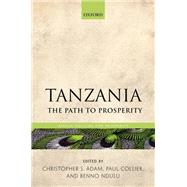- ISBN: 9780198704812 | 019870481X
- Cover: Hardcover
- Copyright: 3/15/2017
Christopher Adam is Professor of Development Economics at the University of Oxford, UK and Research Associate of the Centre for the Study of African Economies. He is currently the Lead Academic for Tanzania for the International Growth Centre (IGC) and Visiting Scholar at the IMF, working on the DFID-IMF Macroeconomic Research Programme on Low-Income Countries. He studied economics at the University of St Andrews and Nuffield College, Oxford. His academic research focuses on the macroeconomics of low-income countries, particularly those of sub-Saharan Africa.
Paul Collier is a Professor of Economics and Public Policy at the Blavatnik School of Government and Director of the Centre for the Study of African Economies. He took a five year Public Service leave, 1998-2003, during which he was Director of the Research Development Department of the World Bank. He is also a Professeur invite at Sciences Po, and at Paris 1. In 2008 he was awarded a CBE 'for services to scholarship and development'. He is the author of The Bottom Billion, which in 2008 won the Lionel Gelber, Arthur Ross and Corine prizes and in May 2009 was the joint winner of the Estoril Global Issues Distinguished Book prize. He is Advisor to the Strategy and Policy Department of the IMF and advisor to the Africa Region of the World Bank. He writes for the Independent, the New York Times, the Financial Times, the Wall Street Journal, and the Washington Post.
Benno Ndulu was appointed Governor of the Central Bank of Tanzania in January 2008. He started his career at the University of Dar es Salaam in the early 1980s before joining the World Bank as a Lead Economist. He is best known for his involvement in setting up and developing one of the most effective research and training networks in Africa, the African Economic Research Consortium. He received an honorary doctorate from the International Institute of Social Studies (ISS) in The Hague in 1997 in recognition of his contributions to Capacity Building and Research on Africa. Following his Ph.D. degree in economics from Northwestern University in Evanston, Illinois, he taught economics and published widely on growth, adjustment, governance and trade.
1. Introduction: Productivity, Organizations, and Connectivity, Christopher Adam, Paul Collier, and Benno Ndulu
2. The Building Blocks towards Tanzania's Prosperity: Lessons from Looking Back and The Way Forward, Benno Ndulu and Nkunde Mwase
3. Managing Hydrocarbon Resources, Mark Henstridge and Dennis Rweyemamu
4. Transforming Dar es Salaam into a City that Works, Paul Collier and Patricia Jones
5. Trade, Logistics Infrastructure, and Regional Integration, Charles Kunaka, Olivier Hartmann, Gael Raballand, and Rukia Shamte
6. Agricultural Transformation in Tanzania: Linking Rural to Urban through Domestic Value Chains, Douglas Gollin and Radhika Goyal
7. Unlocking Tanzania's Manufacturing Potential, Margaret McMillan, John Page, and Samuel Wangwe
8. Tanzania: Building a Skills Agenda towards Productive Employment, Mahjabeen Haji and Jacques Morrisset
9. Growth and Poverty: A Pragmatic Assessment and Future Prospects, Channing Arndt, Vincent Leyaro, Kristin Mahrt, and Finn Tarp
10. Public Investment and Fiscal Reforms, Christopher Adam, Jehovaness Aikaeli, and Anne Laski
11. Monetary Policy in Tanzania: Accomplishments and the Road Ahead, Pantaleo J. Kessy, Stephen A. O'Connell, and Johnson Nyella
12. Financial Sector Development and Financial Inclusion, Natu Mwamba, Nangi Massawe, and Kennedy Komba
The New copy of this book will include any supplemental materials advertised. Please check the title of the book to determine if it should include any access cards, study guides, lab manuals, CDs, etc.
The Used, Rental and eBook copies of this book are not guaranteed to include any supplemental materials. Typically, only the book itself is included. This is true even if the title states it includes any access cards, study guides, lab manuals, CDs, etc.
Digital License
You are licensing a digital product for a set duration. Durations are set forth in the product description, with "Lifetime" typically meaning five (5) years of online access and permanent download to a supported device. All licenses are non-transferable.
More details can be found here.






